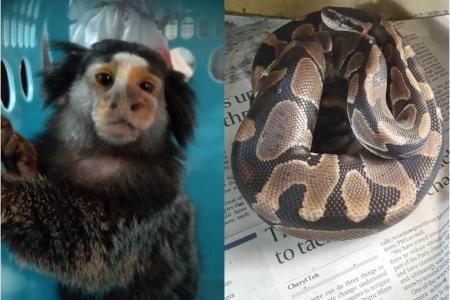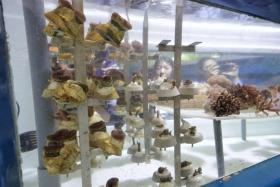Marmoset euthanised, ball python found in plastic bag
Animal Concerns Research and Education Society (Acres) has reported two cases of exotic illegal pet abandonment to the National Parks Board (NParks) for further investigation.
On Tuesday, the organisation posted on its Facebook page that its team was alerted to an abandoned male marmoset found on a tree at 701 Geyland Road on May 27.
The monkey was rescued, then sent to Wildlife Reserves Singapore.
Upon further examination, it was found to be in poor condition.
In its Facebook post, Acres described the marmoset to be "very thin", with signs of "moderate to severe dental and gum disease, as well as tumours".
It eventually had to be euthanised on "humane and welfare grounds" due to the severity of its condition.
On June 1, Acres rescued a ball python from the bin centre of 52 Chin Swee Road, and is now taking care of it.
A cleaner had found a white plastic bag at the lift lobby and brought it to the bin centre to discard it. He then spotted the snake peeking out, and it slithered out of the bag.
Members of the public who have information on these two cases can e-mail acrescrime@gmail.com
Ms Jessica Kwok, group director of animal and veterinary service at NParks, told TNP the number of reports of pet abandonment received during the February to May period in 2019 and 2020 "did not show any marked difference and averaged at slightly over 30".
JAIL TERM
Individuals who are found guilty of abandoning their pets or fail in their duty of care towards their pets are liable to a maximum fine of $10,000 and/or a maximum jail term of 12 months for their first conviction.
Ms Kwok said: "Exotic wildlife should not be kept as pets in Singapore. Wild animals may transmit zoonotic diseases to humans and could potentially be a risk to public safety if they escape into our urban environment.
"Wild animals that are non-native to Singapore may also pose a threat to our biodiversity, if released into the environment. The animal's welfare may also be compromised due to unsuitable living conditions, poor diet and improper husbandry."
Get The New Paper on your phone with the free TNP app. Download from the Apple App Store or Google Play Store now


